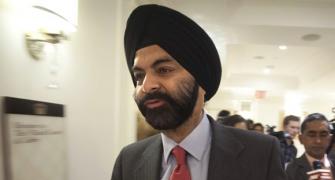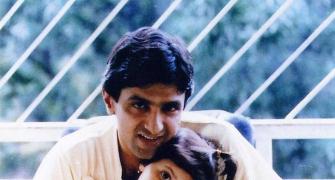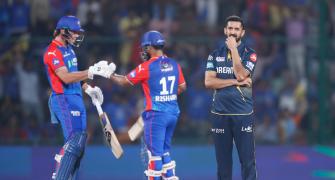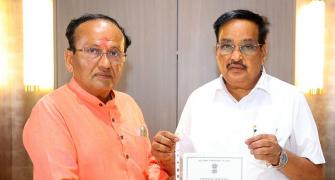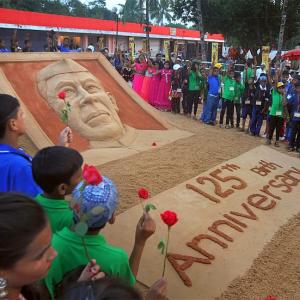
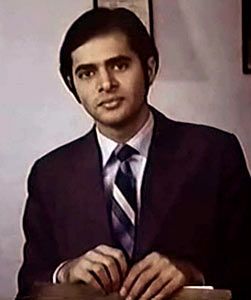
'I don’t know how they dared to send Krrish for a National Award. It was a horrible film!'
'Films like Dabangg and Bang Bang are trash films.'
'Goliyon Ki Rasleela: Ram Leela was so bad; only the music was good.'
Straight talk from Garm Hava director M S Sathyu.
M S Sathyu, 84, is not used to the sudden media attention his 1973 release Garm Hava is getting.
His cell phone is constantly ringing, and he's bombarded with requests for interviews.
Sathyu, who lives in Bangalore, is currently staying in his cozy Mumbai flat -- located in the posh Juhu area -- to promote Garm Hava, which has been re-released on November 14 after being digitally restored.
"In the last two days, I have been getting so many calls from media people... what makes you do that? My movie is 40 years old. Why has it become so important for the media?" he asks me.
In his hour-long interview, Sathyu talks to Patcy N about his film, and also talks about the movies made today.
You saw the movie again after 40 years. What was going on in your mind? Would you have made it differently today?
The technology has changed; the visual and sound quality has been revolutionised. When we made the film, all this was not available. Even if it was available, I don’t know whether we would have had the money to make use of it.
Today there is digital technology; it was very exciting to see my own film with that changed look.
I feel nostalgic; there are so many things one experiences during the making of a film. You think of so many things you failed to achieve.
When I see it now I say, oh, what a mistake I have made, I could have improved that. But one should not be overwhelmed by one’s own work.
There were some constraints then. Like, there is a riot scene in the movie where we showed very few people. We created a little skirmish and there was a fire sequence. We did not have the means to create a real fire. In the dialogue we say the whole city is burning but we couldn't visually show it. That was perhaps a constraint of money and manpower.
Today, with the technology you can artificially create that effect ---you really don't have to burn anything.
Did you think when you made this film that it would reach such heights?
Frankly speaking, 40 years ago we never thought this film would mean something. Somehow, it has sustained itself. It has become a film classic in India.
I only wanted to make a good film as best I could.
This was your debut film. Why did you choose a story by Ismat Chugtai?
I just wanted to make a film. I gave two scripts to the FFC Film Finance Corporation. They like the subject of this one and said they will fund me.
There was no great intention of making a film on Partition or the minority community as such.
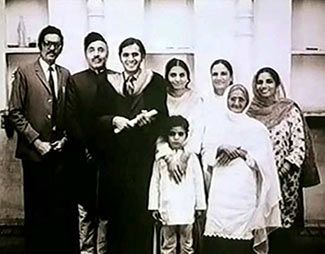 What was the other script that you gave FFC?
What was the other script that you gave FFC?
In the 70s, we lost a young student who became a Naxalite. I wanted to make a film on that.
I made that film later, in Kolkata. It had Anil Kapoor, Pankaj Kapoor and Sharon Prabhakar. It was called Kahan Kahan Se Guzar Gaya.
The FFC backed out later, I heard, so you had no funds to make the film?
They didn't back out, they just gave us Rs 2.5 lakh, which was not enough. Some friends helped out. NFDC gave us a loan and the interest rate for that was 15 per cent. I paid more interest than the amount that I took from them.
I made the movie ultimately in Rs 10 to 12 lakh.
You faced lot of problems while shooting Garm Hava.
There were a lot of troublesome people during our shoot. Uttar Pradesh is not the right place to shoot a film -- too much obstruction. They come in front of the camera and they all want to show off.
It was very challenging but still, we made the film using the people of Agra. I didn't have to hire extras - there were actual people and also police.
We shot the film in one go. It took us about 40 to 45 days.
How did you get the police to work for you?
We called the police and asked them to beat up people and we shot it. They were more than happy to do so.
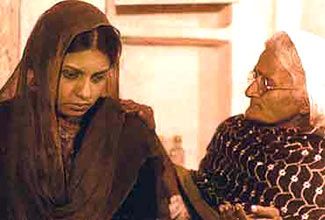 Tell us about the actress Badar Begum (in the picture, right).
Tell us about the actress Badar Begum (in the picture, right).
She was not an actress, she was a prostitute.
I had asked Begum Akhtar, but at the last minute she backed out. Her husband, an advocate, didn’t want her to act. So we started looking for somebody else and we found this lady running a brothel.
Some local people who where shooting with us helped us get to her.
She also had ambitions to become an actress. She had come to Mumbai when she was 16 or 17 years old, tried to get into films but didn’t succeed.
Nimmi came from the same locality but she succeeded.
So Badar Begum went back and became a prostitute. When she grew old, she ran a brothel.
You chose all the actors from IPTA (Indian People's Theatre Association)…
Jamal Hasmi and Jalal Agha were the only two people who were not from IPTA. The rest of the main actors were from IPTA.
Nobody worked for money; there was no money in any case.
I read somewhere that Farooque Shaikh got Rs 750. Is that true?
Yes, that is true. Farooque Shaikh got Rs 750 for the whole movie.
The highest paid was Balraj Sahni. He got Rs 5000. Even if I had not paid him any money he would have done it.
You introduced Farooque Shaikh. How did you find this young talent?
I had seen him in intercollegiate drama and then he worked with us on stage so I knew him very well.
He was very effective. If I needed a dramatic moment, he could respond to it. There was that intensity in him.
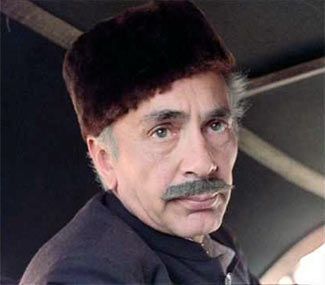 It was Balraj Sahni’s last film. How was he as a person?
It was Balraj Sahni’s last film. How was he as a person?
He was a very friendly person, a very competitive and disciplined actor.
I had worked with him earlier. I had directed him on stage so I knew him personally. It was not a problem to handle him. He would come with lots of suggestions, he would help the actors with his own experience; it was team work.
He suddenly died just one day after he finished the dubbing of the film. He had a heart attack in the morning and again in the evening.
He had suffered a lot because of his daughter’s suicide, he felt guilty about that in a way.
This film has been in restoration since 2009…
The idea came up four years ago but we needed a lot of money.
Ultimately, we found a person who was interested in it. He is not from the film industry. He is from Pune, Mr Deshpande. He is in the construction business. He got interested and he did it.
Even after the film was made it was stalled, right?
It got delayed for a year because we did not get a censor certificate because of the subject.
I knew Indira Gandhi personally so I met her. I knew IK Gujral, who was the then Minster for Information and Broadcasting. Even with personal contacts like that, it took a lot of time.
Plus, there was a mid-term election in UP. They didn’t want the film to be screened there. They did not want people to think that this film was made to woo the Muslim voter. But nothing happened when the film was released.
The phone rings during the interview -- another request for an interview. He says, ‘I am already doing an interview can you call me in an hour.’
He tells me ‘You see what I was saying? Normally, this doesn’t happen. Channels want a byte, they want to come and shoot, this is a new experience that shows that everyone is interested in a good film.
‘Now I am very confident this experiment will succeed. At the screening, we got an amazing response. That shows there is always a discerning audience that is fed up with the kind of stuff that they are made to see.
‘In India, cinema-going is a big thing. It is an outing. Watching a film on the big screen and watching a film on television is a different experience. The multiplex culture is also different. People go around, they eat, they shop in air-conditioned comfort. This is a new culture that has caught on very fast.’
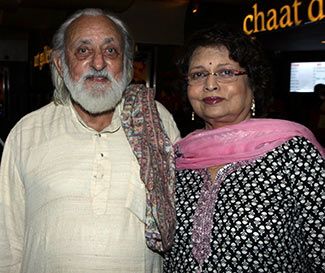 Are you happy with this changed culture?
Are you happy with this changed culture?
Multiplexes are very expensive. The common man cannot afford it. That’s why we are releasing Garm Hava not only in multiplexes but also in single screens.
You haven’t made many movies overall and not many Hindi films in particular. Why?
I made nine films, three of them in Hindi apart from Garm Hava. The rest are in Kannada. One film is in Punjabi.
The reason for not doing many movies was finance. I have not had enough financial support in spite of my films doing pretty well. It is because of their political content that people are shy to finance it.
I made films in Kannada because it is my mother tongue.
When did you shift base from Mumbai to Bangalore?
I shifted to Bangalore in 1982. I was in Mumbai from 1952.
Image: M S Sathyu with Garm Hava's lead actress Gita Siddharth
How did you get interested in films? You were studying for a BSc degree in Mysore.
I was interested in theatre and cinema. I was also interested in painting in school and college days.
I decided that whatever I was studying was useless for me because I didn’t want to become a geologist or something.
So one day I decided to come to Mumbai and try it out here. I had lost my mother when I was only 10. My father tried to advise me about financial security like every parent. In those days, the film profession was not considered good socially, so you have to convince or defy.
I came to Mumbai and stayed with my sister for six months. My father supported me, sending Rs 50 a month. After six months, I told him it’s okay, I don’t need any support.
My sister’s husband was transferred to Nagpur, so they shifted there. I had made lots of friends by then and would just spend an evening or night with different friends. They gave me something to eat, so food was taken care of. (laughs)
I was unemployed for four years. Dina Pathak’s first husband Ramesh Sanghvi was a journalist and his flat was vacant as he was in London. I didn’t have to pay any rent.
You did freelance animation too…
I learnt animation for a few months, and when I started working for them I asked them for a salary. They offered me Rs 40 per month. I felt frustrated and left the job.
I did some freelance animation work and then I got a call from Chetan Anand, who knew me through theatre. He offered me a job that started my film career.
I worked in three films as an assistant: Nimmi, Krishna Dhawan, Chetan Anand starrer Anjali, Meena Kumari and Dev Anand starrer Kinnare Kinnare and Rajesh Khanna’s first film Aakhri Khat.
After that, I did the art direction for Haqeeqat in 1963. We shot in Ladakh. I got my first Filmfare award for it.
Then again I did theatre and ad films. I am the first person to introduce film stars in ads in India.
Sanjeev Kumar was the first actor to do an ad, for Barclay Cigarettes. Rajesh Khanna, Prem Chopra, Benjamin Gilani and Shabana Azmi were my models.
After that, I made some documentaries for the Karnataka Government. I did children’s films like Ek Tha Chotu Ek Tha Motu. It had no dialogues just music, so that children could understand.
I did an Indo-Russian children’s film with Russian director Aleksandr Zguridi called Black Mountain. I also worked on a French film.
After that I did Garm Hava.
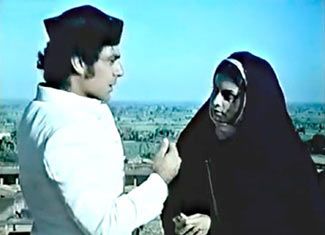
Garm Hava was India’s entry for the Oscars.
Garm Hava premiered in Paris in January 1974. A famous film critic from Le Monde recommended I take the film to the Cannes Film Festival.
At Cannes, people from the Oscars saw the film and invited the film to be screened in the foreign language section. There was no lobbying or anything, unlike today.
I may not have received an award, but I got a certificate for participation.
You are still directing plays…
Yes, three days ago I came from Chandigarh with our play Amrita Pritam. It will be staged in Mumbai too.
Do you watch movies that are made today?
I was on the jury for the National Awards so I had to watch movies in various languages.
I saw The Lunchbox. Ship Of Theseus was a good film. I saw Kai Po Che.
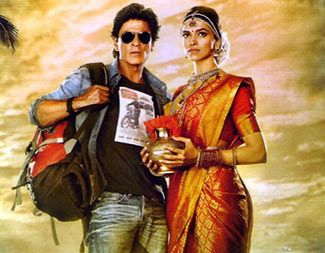 What do you think of the films being made today?
What do you think of the films being made today?
There is some bad stuff and good stuff, but the good stuff is very few. They make bad films effortlessly and put lots of money into it.
This money business is hype. In three days they say we collected Rs 100 crore. No film can collect that much. It’s impossible.
There are good filmmakers like Anurag Kashyap, Rakeysh Omprakash Mehra, Vishal Bhardwaj… There are some younger directors too who are very good.
Otherwise, there are films like Dabangg and Bang Bang -- these are trash films.
They just want to claim that they are making a hundred crore film. Why don’t the entertainment tax people question them?
If you are stating officially that you have made Rs 100 crore, how much did you pay as entertainment tax?
If you are saying you made Rs 100 crore, have you paid Rs 50 crore to the government? They should be fined.
For Chennai Express, they said they collected Rs 300 crore. I went for an afternoon show in Bangalore, there were 50 to 60 people in a theatre of 1,000 capacity in the first week of its release. And they are claiming it’s playing to packed houses! It was a bad film. The actors were so bad.
Sanjay Leela Bhansali’s Goliyon Ki Rasleela: Ram Leela was so bad. Only the music was good. Deepika Padukone is a good looking girl but no acting talent.
In recent times who do you think are good actors?
Vidya Balan, Richa Chadda, Anushka Sharma and Nimrit Kaur.
Among the men, Irrfan is a good actor but he mumbles his dialogues and is repetitive.
Aamir Khan is a good actor. He is very sensitive. I liked his performance in Lagaan, although (director) Ashutosh Gowariker has a simple solution for everything. The whole problem of taxation was decided on the cricket field.
He did the same thing in Swades. The electricity problem was solved by putting a little tank, a little water and water trickled down. He put in a little pump and bulbs were burning.
I mean a person who comes from NASA, will he go to Chor Bazar (a flea market in South Mumbai) and buy a generator? He could have thought of an alternative system to produce electricity like how satellites have solar electricity and things like that.
How much water can you store in a small tank? And how long can you produce electricity even for one zero volt bulb? Stupid film!
Do you watch films like Dabangg?
No. But I happened to see one of Hrithik Roshan’s films, Krrish, that came up for the National Award. I don’t know how they dared to send it for a National Award. It was a horrible film.
There is a rule that every film should be seen fully, even if it is bad. You can make out a film is bad within the first half an hour. So it should be rejected right then. But somebody went to court and filed a case saying the jury must see the whole film and then decide and the court passed the rule.
I must have seen 160 films in one month. Since I was in the Eastern Panel I had to watch all the films made in the East of India like Assam and Bengal. But once all the films from all the zones where shortlisted, I was put in the central panel and I had to watch all the shortlisted films.
There are so many things wrong with the rules. They say ‘adapted screenplay’. How many have read the original book? Most of them have not read it so how do you know how it is adapted?
Anant Murthy wrote a story called Prakruti, which was made into a film. That film got an award for best adaptation. I was the only member on the jury who had read the book. And I knew it was well done. But how do you talk about other languages?
What are you doing apart from the Amrita Pritam play?
We are doing shows of Darindey The Villains. It’s an American play for which I have done production design.
Next month I am doing a play called Mudrarkshas. We will stage it in Delhi on December 25.
My play Girja Ke Sapney will be staged in Guwahati on December 13.
When do you plan to make your next film? You haven’t done anything since your 2009 film, Ijjodu?
I will do one next year. I have not been able to find a producer.

